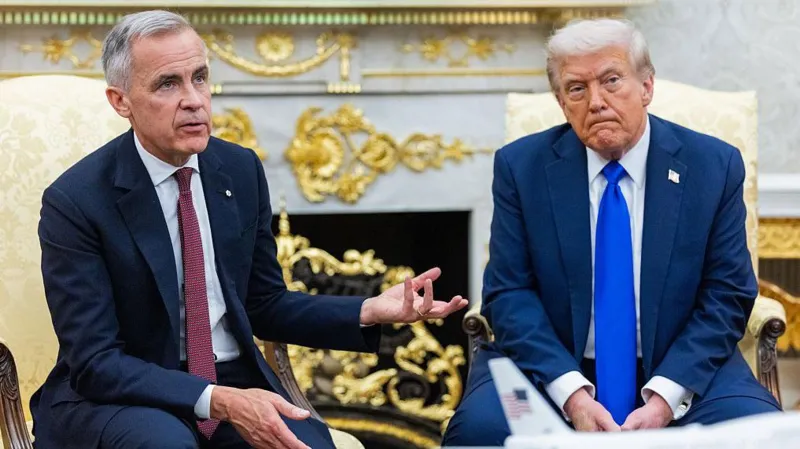Canada’s Prime Minister Mark Carney says Ottawa is willing to return to the negotiating table “whenever the Americans are ready,” even as Donald Trump abruptly ended trade talks with the country.
The US president’s move came after an advert by Ontario’s provincial government featured Ronald Reagan’s voice warning that tariffs “hurt every American.” Trump slammed the ad as “FAKE” and “egregious,” accusing Canada of meddling in US affairs.
Washington has slapped 35% tariffs on a range of Canadian products, including steel and cars, measures that have hit Ontario particularly hard.
Carney has been trying to ease the tariffs since returning to office earlier this year, but efforts have been complicated by Ontario Premier Doug Ford’s public opposition to the levies.
Meanwhile, the Reagan Foundation has accused Ontario of using selectively edited audio and of failing to seek permission to use the late president’s remarks, saying it’s reviewing possible legal action.
Trump, citing that complaint, claimed the ad was an effort to sway the US Supreme Court’s upcoming ruling on the legality of his sweeping tariffs a decision that could have major economic consequences.
Carney avoided direct comment on the controversy, stressing instead that Canada is making progress in diversifying trade, particularly with Asian economies. He made his remarks before leaving for the ASEAN Summit in Kuala Lumpur, which Trump is also expected to attend.
Premier Ford later posted the full Reagan speech on social media, writing that “Canada and the US are stronger together.”
The controversial Ontario advert may shuffle the order of Ronald Reagan’s original 1987 speech, but it doesn’t change his words. Lines were rearranged — the clip’s second-to-last sentence actually appears near the start of the real speech, while another line midway through the ad comes from earlier in the address.
Reagan’s “Address to the Nation on Free and Fair Trade” explained why his administration had placed temporary tariffs on some Japanese imports, even though he believed such restrictions were harmful in the long run. He described the measures as “special” and temporary, insisting they should be lifted quickly to restore the benefits of open trade.
Still, Donald Trump took issue with the ad, claiming Reagan “loved tariffs for our country” and defending his own protectionist stance.
Speaking later, White House economic adviser Kevin Hassett said the move to end trade talks with Canada reflected “growing frustration” in Washington. “The Canadians have been very difficult,” he told reporters. “Sometimes when you’re frustrated, a time-out is the right call.”
Ontario’s controversial Reagan advert is part of a C$75 million campaign that aired across major US television networks, aimed at rallying public opposition to Trump’s tariffs on Canada.
Premier Doug Ford defended the campaign online, saying Ontario would “never stop making the case” against the trade penalties. Interestingly, China’s embassy in Washington had used a similar Reagan soundbite earlier this year to question Trump’s global tariff agenda.
Ontario — home to nearly 40% of Canada’s population and a powerhouse of manufacturing and trade has been hit especially hard by US tariffs. Ford, known for his fiery rhetoric, once warned he could cut electricity exports to the US, accusing Washington of “stabbing Canada in the back” with unfair trade policies.
Trump’s tariffs include a 50% duty on metals and 25% on automobiles, as well as broader global levies on steel and aluminium, measures that have led to layoffs and mounting costs for Canadian producers.
This is the second breakdown in US–Canada trade talks under Trump. The first occurred when Ottawa announced a digital services tax targeting US tech companies a move it later withdrew after the White House accused Prime Minister Carney of folding under pressure.
Source: BBC News






